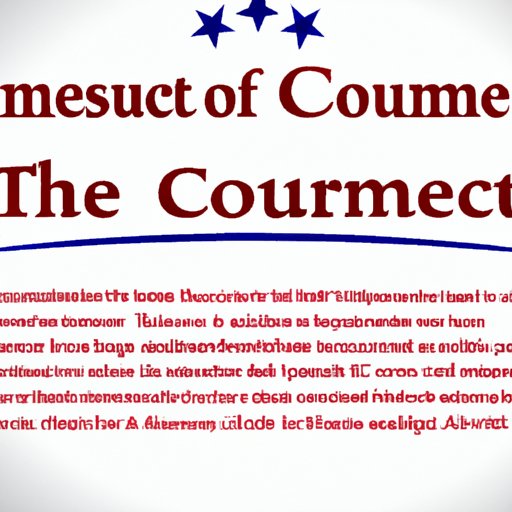Introduction
The Commerce Clause is an important part of the United States Constitution that outlines the power of Congress to regulate interstate commerce. It has been a source of debate and controversy since its inception as it has been used to limit state power and promote economic activity. This article will explore the history and legal significance of the Commerce Clause and discuss how it affects modern day issues related to state sovereignty and the US economy.
Exploring the Historical Context of the Commerce Clause
The Commerce Clause was first introduced in 1787 with the passage of the US Constitution. The clause states that “Congress shall have Power… To regulate Commerce with foreign Nations, and among the several States, and with the Indian Tribes.” This clause was included in the Constitution as a way to ensure that all states had access to goods and resources from other states and to prevent any one state from having an unfair advantage over another. It was also seen as a way to promote economic growth and development throughout the newly formed United States.
The Commerce Clause was an important part of the Founding Fathers’ vision for the United States. They believed that it would provide a mechanism for the federal government to protect the nation’s economic interests while also allowing individual states to maintain their autonomy. As Alexander Hamilton wrote in The Federalist Papers, “The regulation of commerce, it is true, is a new power; but that seems to be an addition which few oppose, and from which no apprehensions are entertained.”

Outlining the Legal Significance of the Commerce Clause
The Commerce Clause is a broad provision of the US Constitution that grants Congress the power to regulate interstate and international commerce. This means that Congress can pass laws that govern the buying and selling of goods across state lines, as well as the transportation of goods from one state to another. Additionally, Congress can regulate activities that have a substantial effect on interstate commerce even if those activities take place entirely within one state.
The Commerce Clause has been the subject of numerous court cases throughout the years. In the landmark case of Gibbons v. Ogden (1824), the Supreme Court ruled that the Commerce Clause gives Congress the power to regulate navigation between states, thus limiting the power of states to regulate navigation on their own. Similarly, in Wickard v. Filburn (1942), the Supreme Court ruled that Congress had the authority to regulate the production of wheat for personal consumption, even if the wheat was grown entirely within one state.

Examining the Impact of the Commerce Clause on State Sovereignty
The Commerce Clause limits the power of states to regulate certain aspects of economic activity. In particular, it prevents states from passing laws that discriminate against out-of-state businesses or impose undue burdens on interstate commerce. For example, a state cannot pass a law that only applies to businesses from other states, or that makes it more difficult for out-of-state businesses to compete with in-state businesses.
However, the Commerce Clause does not completely eliminate state sovereignty. States can still pass laws that regulate certain aspects of economic activity within their borders, such as labor laws and environmental regulations. Additionally, states can still enter into agreements with other states or the federal government to promote economic activity within their borders.

Understanding the Modern Interpretation of the Commerce Clause
The Supreme Court has issued numerous rulings regarding the scope of the Commerce Clause over the past two centuries. In recent decades, the Court has tended to interpret the clause broadly, ruling that Congress has the power to regulate activities that have a substantial effect on interstate commerce. This has allowed Congress to pass laws that regulate a wide range of activities, from healthcare to gun control.
There is still debate about the proper interpretation of the Commerce Clause. Some argue that the clause should be interpreted narrowly, limiting the power of Congress to only those activities that directly affect interstate commerce. Others argue that the clause should be interpreted more broadly, allowing Congress to regulate any activity that has a substantial effect on interstate commerce.
Analyzing the Role of the Commerce Clause in the U.S. Economy
The Commerce Clause plays an important role in the US economy. It allows Congress to pass laws that facilitate the free flow of goods and services across state lines, thus promoting economic activity. Additionally, it prevents states from passing laws that could potentially stifle economic activity by creating trade barriers or discriminating against out-of-state businesses.
However, there are some drawbacks to the Commerce Clause. Critics argue that it gives too much power to the federal government, allowing it to regulate activities that are traditionally within the purview of the states. Additionally, it can be difficult to determine when an activity has a substantial effect on interstate commerce, leading to confusion and uncertainty.
Conclusion
The Commerce Clause is an important part of the US Constitution that has had a significant impact on the US economy and state sovereignty. It has allowed Congress to pass laws that facilitate interstate commerce and prevent states from passing laws that could potentially harm the nation’s economic interests. Despite ongoing debates about the proper interpretation of the clause, it is clear that the Commerce Clause is an essential part of the US legal system and will continue to play an important role in the future.
The importance of the Commerce Clause is often overlooked, but it is an integral part of the US Constitution and has a far-reaching impact on the US economy and state sovereignty. It is important for citizens to understand the implications of the clause and to stay informed about current debates surrounding its interpretation and application. Only then can we ensure that the Commerce Clause continues to serve its intended purpose.
(Note: Is this article not meeting your expectations? Do you have knowledge or insights to share? Unlock new opportunities and expand your reach by joining our authors team. Click Registration to join us and share your expertise with our readers.)
